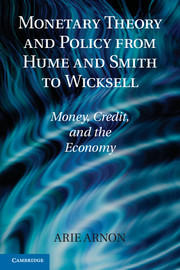Book contents
- Frontmatter
- Dedication
- Contents
- List of Illustrations
- List of Tables
- Preface
- Introduction
- Part one Analytical and Historical Foundations
- Part two Debating Monetary Theory under Inconvertibility
- Part three Debating
- 10 From the Resumption to 1837More Crises
- 11 The Currency School Trio
- 12 The Banking School Trio
- 13 Neither Currency Nor Banking School
- Part four The Road to Defensive Central Banking
- Part five A New Beginning
- Bibliography
- Author Index
- Subject Index
11 - The Currency School Trio
Loyd, Torrens, and Norman
Published online by Cambridge University Press: 05 July 2014
- Frontmatter
- Dedication
- Contents
- List of Illustrations
- List of Tables
- Preface
- Introduction
- Part one Analytical and Historical Foundations
- Part two Debating Monetary Theory under Inconvertibility
- Part three Debating
- 10 From the Resumption to 1837More Crises
- 11 The Currency School Trio
- 12 The Banking School Trio
- 13 Neither Currency Nor Banking School
- Part four The Road to Defensive Central Banking
- Part five A New Beginning
- Bibliography
- Author Index
- Subject Index
Summary
The Automatism of the Currency School
As we saw in the preceding chapters, the 1821 Resumption, contrary to the expectations of the Bullionists at the time, did not bring an end to the monetary fluctuations or to the debates about the role of the monetary system and the responsibility, if any, of the Bank for these fragilities. The agricultural crises of the early 1820s, the severe crises of 1825, and then the downturn of 1836 forced the continuation of public discussions of monetary issues. As we shall see in this chapter, new proposals for reform based on Humean and Ricardian principles were again put at the center of the debate. The supporters of the new reform were known as the Currency School. This chapter will follow their major theoretical arguments and their policy proposals.
The Currency School, typically represented by Samuel Jones Loyd, Robert Torrens, and George Warde Norman, successfully promoted the 1844 Bank Act. The background to the Act was the continued instability and recurring financial crises in the British economy. The banking sector was particularly fragile, and the rise of joint-stock banking after the Resumption caused much alarm. In times of instability, the system relied on the Bank of England, as those who were well informed about the banking system recognized; although by its charter, the Bank had no legal obligation to support the financial system. The recognition that the system was not well secured led in the late 1830s to an old-new idea: Make the money supply – the quantity of coins and notes – behave as would a “pure,” coins-only currency.
- Type
- Chapter
- Information
- Monetary Theory and Policy from Hume and Smith to WicksellMoney, Credit, and the Economy, pp. 187 - 208Publisher: Cambridge University PressPrint publication year: 2010



